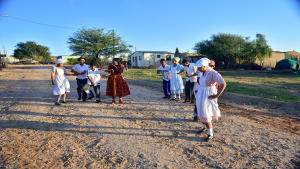Chief Justice of the Constitutional Court Mogoeng Mogoeng says government should encourage people to study and make use of indigenous languages. He says novels should be written in all languages like it used to be before.
Mogoeng says the notion that English will help one progress in the corporate world is wrong because the Chinese, Koreans and many others are surviving using their mother tongue.
He was delivering a speech at an event to celebrate Indigenous Languages at the University of Johannesburg’s Soweto Campus.
Mogoeng encouraged South Africans to prioritise their mother tongues to ensure that they do not lose their identity.
Friday was marked as the day to celebrate indigenous languages across the globe.
Chief Justice Mogoeng says people who lose their language, lose their identity.
“Some people say what is in a language anyway? As long as I can speak and you understand what I say, where the language comes from doesn’t matter. It’s not as easy as that. Language is very important. It tells us who you are.”
Mogoeng says people, more especially the middle class, try so hard to speak English with their children that they even overtake the indigenous English speakers. He says people lose their identity while taking pride in promoting a foreign language.
Unisa Politics Professor Somadoda Fikeni also agrees with the Chief Justice.
“Language is not just something to learn in order to learn directions and how to order food. Language is the storage of the soul; the heritage of the people. When you lose your language, you lose your soul; you lose your history. And there are certain things we cannot translate into English even if we try to. Umuntu ngumntu ngabantu.”
Fikeni says South Africans can say, post 1994, they got their freedom, but there are so many things that they are still not free from.
“In 1994, we were merely given political power. Social and economic still remains elusive. It is for that reason that today we are a numeric majority, but a cultural minority. What we dress, how we speak, the manners are still conditioned by our colonial heritage. Even when you do something right in your house like furniture, kuthwa kwakuhle ingathi kwamlungu (it is said it’s beautiful like a white person’s house). That’s how far we are with ourselves.”
Unisa Politics Professor Somadoda Fikeni says government has invested adequate resources to preserve indigenous languages.
In KwaMbonambi, outside Richards Bay, Minister of Sports, Arts and Culture Nathi Mthethwa, joined hundreds of people to celebrate International Mother Language Day.
It is through the mastery of the mother language that the basic skills of reading, writing and numeracy are acquired. The significance of indigenous languages in transmitting cultural issues, cultural values and traditional knowledge is recognized. #InternationalMotherLanguageDay pic.twitter.com/SJnR3AgN0o
— Min. Nathi Mthethwa (@NathiMthethwaSA) February 21, 2020
There is no doubt that language and literature are both critical aspects of the national identity and distinctiveness of any nation. ???? #InternationalMotherLanguageDay pic.twitter.com/qDi30DOxif
— Min. Nathi Mthethwa (@NathiMthethwaSA) February 21, 2020
#InternationalMotherLanguageDay started off at Department of Correctional services under the theme ” Building Peaceful, inclusive and sustainable society trough the promotion of cross – border languages”, where the Minister of @ArtsCultureSA @NathiMthethwaSA Donated books pic.twitter.com/On9gfuCZb7
— GCIS_KwaZulu-Natal (@GCIS_KZN) February 21, 2020
Rossburgh Secondary School mathematics teacher, Zoleka Nombona, says it is difficult to teach subject terminology in a way that learners, whose mother tongue is one of the African languages, understand it. This is due to the switch from mother tongue instruction to English as medium of instruction in primary school.
She says learners do not necessarily struggle with solving problems, but rather to grasp the language. Nombona has found an innovative way to get the message across.
“What I usually do is to use the shape of my body. This is a right angled triangle and this is a sharp angle. How do you see it, you see it most by 90 degrees the sharp corner, but you must see also 90 degrees. The part of your body will be the one in use, the one that is facing 90 degrees.”
While English remains the language of choice in business circles, government says it’s using museums and research tools to promote indigenous languages. Minister Mthethwa says, despite the indigenous languages not being the medium of instruction in schools, measures are in place to develop mother languages.
Government says it’s currently converting classic literature in indigenous languages into digital format to encourage young people to read it. – Additional reporting by Nonkululeko Hlophe.
In the audio below, acting PanSALB CEO Dr David Maahlamela speaks on the importance of preserving the Mother Tongue:






